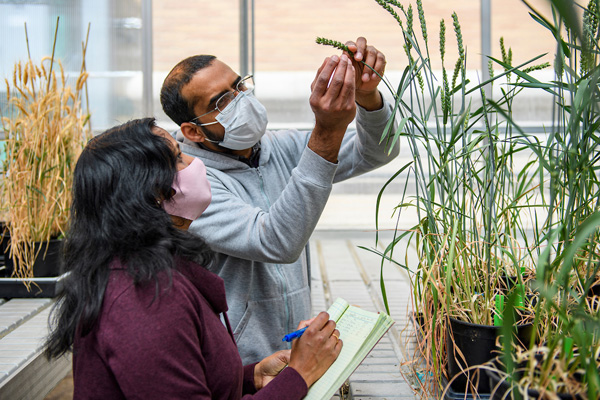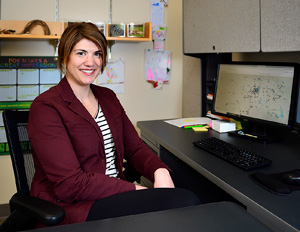|
|
|
|
|
|
 | S
|
Recognition for Tier One Status
UNT's attainment of Tier One research university status in the Carnegie Classification is listed as one of the top 50 achievements in the region in the North Texas Commission's 50 for 50 campaign. The campaign celebrates the 50th anniversary of the commission, which was chartered in 1971 to market the North Texas region. The accolade acknowledges the significant investment UNT made to join the ranks of the top research universities in the nation in 2015 and continues to make as it increases its research productivity — all while increasing diversity and maintaining the consistently high-quality education that serves students from North Texas and around the world.
|
|
|
|
|
|
|
|
 Introducing Middle School Students to Citizen Science Introducing Middle School Students to Citizen Science
The National Geographic Society awarded researchers from UNT's Advanced Environmental Research Institute (AERI) a grant to introduce middle school students to scientific research projects through citizen science. Supported through the Texas Geography Education Fund, the project invites teachers and students to map air quality in their own communities. Kelly Albus with AERI, Lu Liang from the Department of Geography and Sara Champlin from the Mayborn School of Journalism, are using a network of low-cost air quality sensors to engage classrooms across Texas in ongoing research.
|
|
|
|
|
|
| Researchers Among Top 2% of Scientists on Stanford List |
A recently published list of the world's top researchers has reinforced UNT's reputation as a world-class Tier One research university. Forty-six UNT researchers were included in the ranking of the world's most cited researchers, who are among the top 2% of more than six million scientists worldwide within their specialty areas throughout their careers. Fifty-one researchers were among the top 2% for a single year — 2019. The ranking method is based on standardized citation metrics developed by a group of scientists led by a statistician at Stanford University and is considered by many as a more holistic method of judging the impact of a researcher's work compared to use of a single metric.
|
|
|
|
|
|
|
|
| Searching for a Heart Defect Treatment for Preemies |
|
Ed Dzialowski, a developmental comparative physiologist who studies the similarities and differences of anatomy and physiology between species, is conducting cardiopulmonary research that could assist the treatment or prevention of a common birth defect in premature infants. Funded by a grant from the National Institutes of Health, he and his research team are studying the ductus arteriosus — the fetal artery connecting the aorta and pulmonary artery. He's hoping to find an alternative treatment to surgery for a condition known as patent ductus arteriosus, or PDA, that often occurs in infants born prematurely.
|
|
|
|
|
|
|
| Looking for the Magic in Mushrooms |
|
Elizabeth Skellam, new assistant professor of chemistry, is using genomics to help uncover fungal molecules that could potentially be used as new medicines or natural pesticides. She recently received a Bayer Crop Science Grants4Ag Award for her work using fungi as biocontrol agents to protect crops against specific plant pathogens. And a new National Science Foundation grant is helping her get her lab up and running. It's a grant she had time to apply for while trying to make her way to Denton from Europe. "That was like six months of absolute chaos," she says. "I just want to express how grateful I am to UNT for helping me get here in the middle of the pandemic."
|
|
|
|
|
|
|
| Summer Opportunities in AI Research |
|
Engineering faculty are helping prepare the future workforce in artificial intelligence through three separate programs this summer. Hui Zhao and Mark Albert were awarded a grant by the National Science Foundation through its Research Experiences for Undergraduates program to provide 10-week programs in accelerated deep learning. Two other programs, organized by Mark Albert and Ting Xiao, will offer AI training specifically for UNT students. AI4All is working with UNT to offer an immersive research program for undergraduates interested in AI with no prior computing experience necessary, and the UNT AI Summer Research Program will provide an immersive experience to guide UNT graduate and undergraduate students already in AI-related programs through all stages of the research process.
|
|
|
|
|
|
|
| Studying Remote Learning during the Pandemic |
|
College of Education Assistant Professor Lauren Eutsler is studying how teachers are handling the new world of education after a shift to remote instruction due to COVID-19 restrictions. She notes in her published research, with researchers from the University of Florida and York College of Pennsylvania, that priorities have shifted since remote learning. While individual safety and well-being were the priority when everyone first went into lockdown in response to the COVID-19 health crisis, self-care is often stressed as a priority after a year of socially distanced living, isolation and quarantine.
|
|
|
|
|
|